【精品同步课件】北师大英语必修1:Unit 3 Celebration SectionⅣ
文档属性
| 名称 | 【精品同步课件】北师大英语必修1:Unit 3 Celebration SectionⅣ |

|
|
| 格式 | rar | ||
| 文件大小 | 868.7KB | ||
| 资源类型 | 教案 | ||
| 版本资源 | 北师大版 | ||
| 科目 | 英语 | ||
| 更新时间 | 2011-10-05 00:00:00 | ||
图片预览




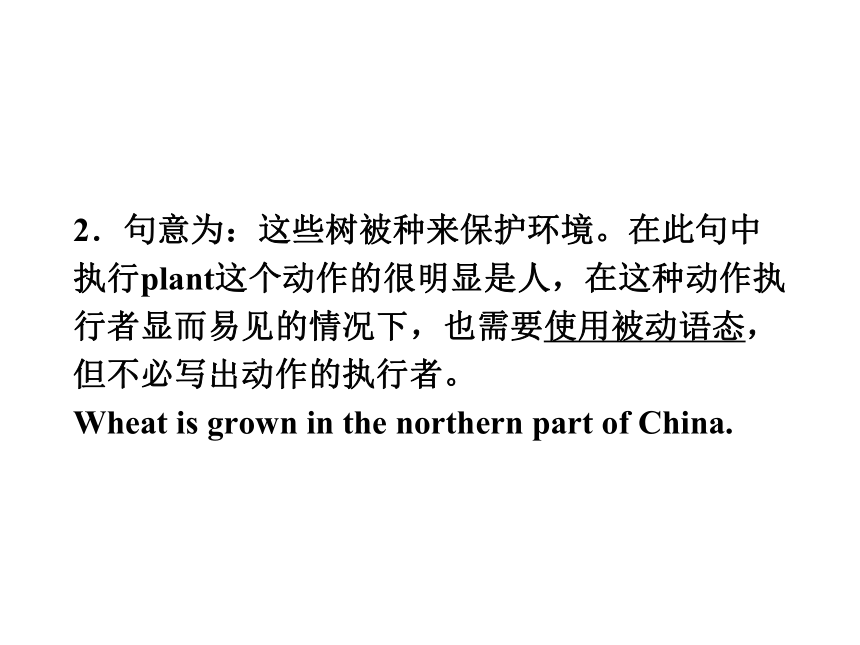
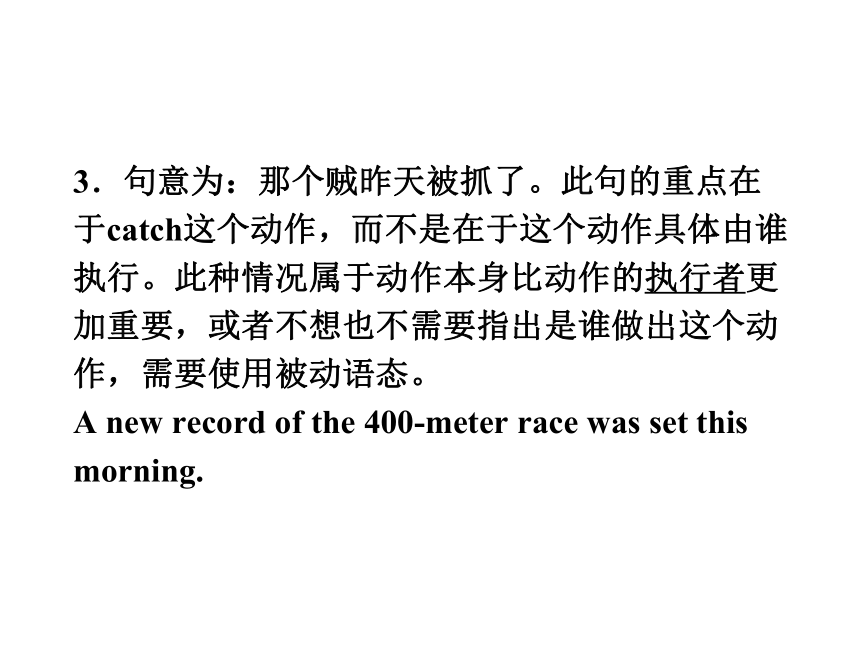
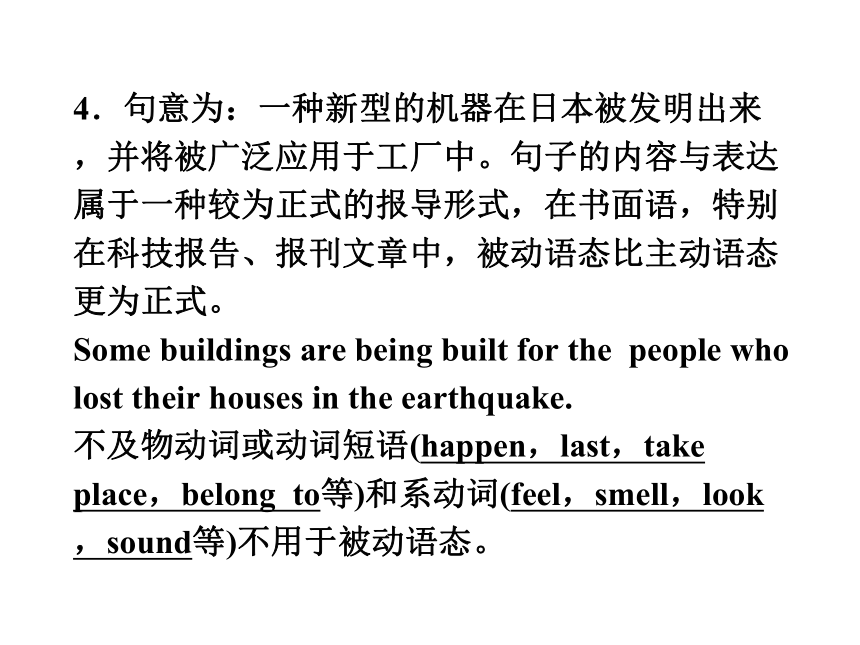

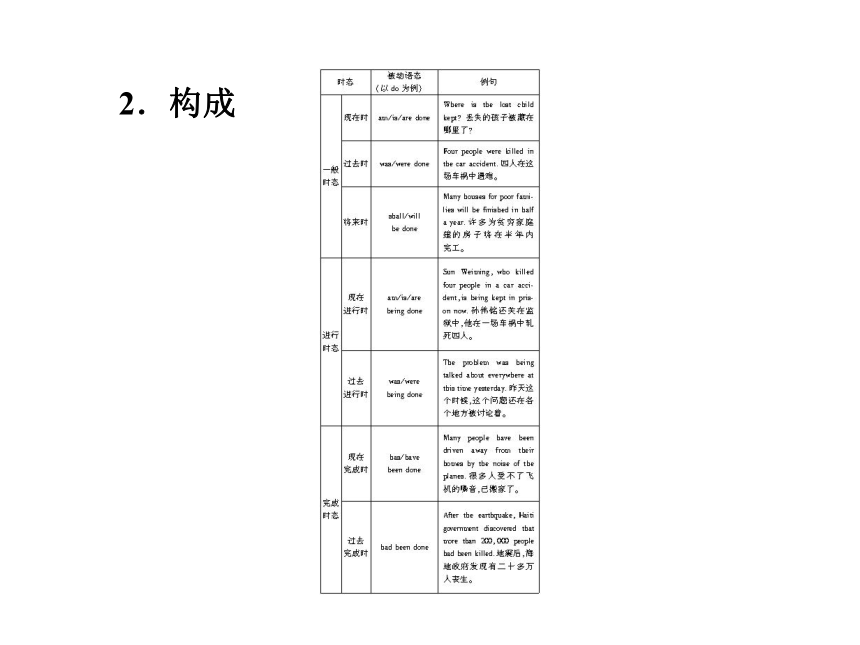
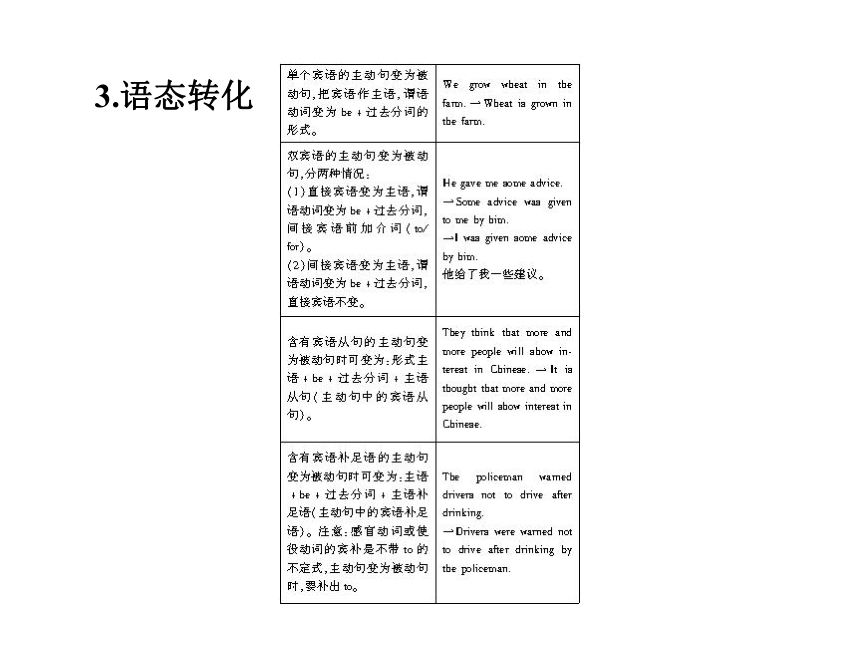
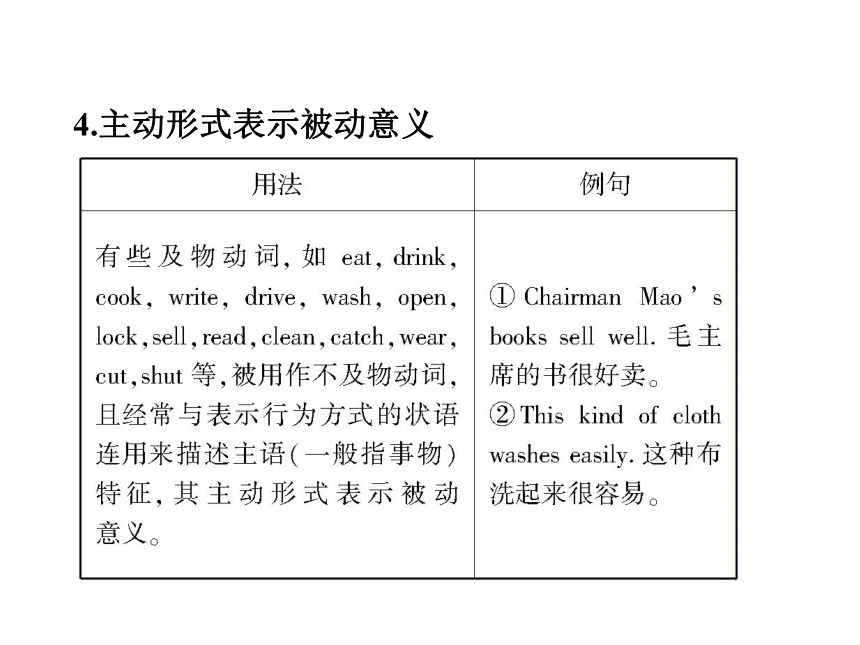

文档简介
(共44张PPT)
Section Ⅳ Grammar & Writing
写作专题突破
Unit 1
语法专题突破
Section Ⅳ
语法专题突破
被动语态
品味语法
1.The table in his room is made of wood.
2.These trees were planted to protect the environment.
3.The thief was caught yesterday.
4.A new kind of machine has been invented in Japan and it will be widely used in the factories.
自我探究
以上四个例句说明了需要使用被动语态的四种情况。
1.句意为:他房间里的桌子是由木头制成的。句子的目的在于交代桌子的材质,并不需要了解make这个动作的具体执行人。在同样情况下,不知道并且也不需要知道动作的具体执行者时需要使用被动语态。
The playground is decorated with many beautiful flowers for the coming sports meeting.
2.句意为:这些树被种来保护环境。在此句中执行plant这个动作的很明显是人,在这种动作执行者显而易见的情况下,也需要使用被动语态,但不必写出动作的执行者。
Wheat is grown in the northern part of China.
3.句意为:那个贼昨天被抓了。此句的重点在于catch这个动作,而不是在于这个动作具体由谁执行。此种情况属于动作本身比动作的执行者更加重要,或者不想也不需要指出是谁做出这个动作,需要使用被动语态。
A new record of the 400 meter race was set this morning.
4.句意为:一种新型的机器在日本被发明出来,并将被广泛应用于工厂中。句子的内容与表达属于一种较为正式的报导形式,在书面语,特别在科技报告、报刊文章中,被动语态比主动语态更为正式。
Some buildings are being built for the people who lost their houses in the earthquake.
不及物动词或动词短语(happen,last,take place,belong to等)和系动词(feel,smell,look,sound等)不用于被动语态。
1.概念及应用:
语态是动词的一种形式,表示主语与谓语动词之间的关系。被动语态则表示主语是动作的承受者。一般来说,当强调动作的承受者,而不强调或者没有必要指出动作的执行者时,习惯用被动语态。被动语态由“be+过去分词”构成,be随人称、数和时态的变化而变。
讲解归纳
2.构成
3.语态转化
4.主动形式表示被动意义
情态动词
品味语法
一、have to和not have to
1.It’s 9 o’clock.I have to pick up Jim now.
2.We will have to paint our house this weekend.
3.You don’t have to return my book now.
自我探究
1.have to强调客观需要,或表示受环境制约,常译为“不得不”,如例1;在人称和时态上可以有更多的变化,如had to.will have to,have had to,had had to 等,如例2。
2.have to的否定形式don’t have to意为“不必,不需要”,如例3。
1.must也可以表示“必须”,但突出说话人的主观看法或主观意愿,表示“敦促”或“命令”,语气强烈。从时态上看,一般表示现在或将来。must无人称、数和时态的变化。
I don’t want to talk with him.I must go now.
You mustn’t play games in the street.It’s too dangerous.
讲解归纳
2.must的第一个否定形式为mustn’t,意为“禁止,不准,不允许,绝不可以”;must的第二个否定形式为don’t have to/needn’t,意为“不必”。
You mustn’t tell him the truth.
—Must I speak so loudly
—No,you needn’t.
二、can和can’t
品味语法
1.Don’t worry.I can see him tonight.
2.If it’s raining tomorrow,the sports can take place indoors.
3.That can’t be true.I stayed with Mary at that time.
4.Can I go to have a picnic with you
5.You can’t park your car here.
自我探究
1.can表示做某件具体事情的“能力”, 如例1。
2.can表示“可能”,往往指逻辑上的“可能性”,如例2。
3.can’t表示否定推测,语气很强,意为“根本不可能”,与must“一定”表示肯定推测时相对。如例3。
4.can表示请求对方许可,意为“可以,能够”;can’t表示“不可以”。如例4、例5。
1.表示“有能力”时,can与be able to可通用,在许多场合可互换使用。be able to有更多的时态变化,如:将来时、完成时等,如下面例句,此时不能用can。
Will you be able to change jobs in few months
2.be able to可表示“经过努力而成功地做了某事”。
The plane was able to fly over the mountain,and the passengers felt safe.
3.be able to后不可接被动式,而can可以。
The work can be finished within an hour.
讲解归纳
三、ought to和ought not to
品味语法
1.You are his father.You ought to take care of him.
2.You oughtn’t to smoke too much.
3.—Ought we to keep fit by taking pills
—No,you oughtn’t (to).
自我探究
1.ought to与should都可意为“应该”,后面直接接动词原形。大多数情况下,ought to和should可以通用,但在强调客观性,如表示法律、章程或道义上的“应该”时,一般还是用ought to更好。如例1。
2.ought to的否定式是ought not to或oughtn’t to,意为“不应该”,如例2。
3.用于一般疑问句时,应将ought提至句首;ought to用于一般疑问句时,简略答语中可省略to,如例3。
语法专练
写作专题突破
应用文写作:节日简介
【题目要求】
假设你是李华,你远在美国的笔友Jack对中国的春节很感兴趣,他来信向你询问有关情况。请你根据以下要点给他回一封电子邮件,简单介绍春节以及中国人是如何过春节的。
要点:1.春节在中国的地位;
2.春节持续的时间;
3.春节来临之前人们的活动;
4.除夕人们的活动;
5.春节期间人们的活动;
6.你对春节的态度。
注意:1.词数100左右;
2.可适当增加细节,以使行文连贯;
3.开头和结尾已给出,不计入总词数。
Dear Jack,
Thanks for your e mail.I’m glad to tell you something about China’s Spring Festival.
___________________________________________
___________________________________________
___________________________________________
___________________________________________
How do you like the Chinese Spring Festival?I look forward to hearing from you.
Yours,
Li Hua
【构思谋篇】
【关键词语】
1.最重要的节日________________
2.持续到________________
3.打扫和装饰房屋________________
4.除夕________________
5.串门________________
6.拜年________________
7.亲戚朋友________________
8.放鞭炮________________
9.得到压岁钱________________
答案:1.the most important festival
2.last until
3.clean and decorate their houses
4.on New Year’s Eve
5.got from house to house
6.pay a New Year vistit
7.relatives and friends
8.set off firecrackers
9.get pocket money
【连词成句】
1.春节是中国最重要的节日。
The Spring Festival __________________ festival in China.
答案:is the most important
2.春节来临前人们打扫和装饰房屋迎接它。
________ the festival,people clean and decorate their houses to welcome the New Year.
答案:Before
3.除夕人们合家团聚,一边吃着美味的食物,一边看春节联欢晚会。
________ New Year’s Eve,family usually ____________ to watch the Spring Festival Evening on TV while eating delicious food.
答案:On;get together
4.春节期间人们走亲访友拜年。
________ the festival,people go from house to house to pay a New Year visit to their relatives and friends.
答案:During
5.我可以放鞭炮,拿压岁钱。
I can ____________ firecrackers and get pocket money.
答案:set off
【连句成篇】
________________________________________________________________________
________________________________________________________________________
________________________________________________________________________
________________________________________________________________________
【佳作欣赏】
Dear Jack,
Thanks for your e mail.I’m glad to tell you something about china’s Spring Festival.
The Spring Festival,which is also called Chinese Lunar New Year,is the most important festival in China,just like Christmas in the west.It falls on the last day of the lunar year and lasts until the Lantern Festival.
Before the festival,people clean and decorate their houses to welcome the New Year.On New Year’s Eve,people usually get together to watch the Spring Festival Evening on TV while eating delicious food. During the festival,people go from house to house to pay a New Year visit to their relatives and friends.
I like the Spring Festival very much because I can set off firecrackers and get pocket money from my parents and relatives as well.
How do you like the Chinese Spring Festival?I look forward to hearing from you.
Yours,
Li Hua
There are large numbers of festivals,holidays and①celebrations in the world,②including the Spring Festival,Christmas,③Halloween and ④the Dragon Boat Festival and so on.Now I’d like to introduce something about some of them.
词语串串练
As is known,Christmas is the most important festival in the West and a special ⑤occasion for family to get together.⑥Even_if someone lives far,they manage to get back home ⑦on_time.For ⑧teenagers,it’s an ⑨opportunity to get presents as_well.Younger children often seriously write letters to Father Christmas,hoping to get gifts they’ve looking forward to.With Christmas drawing near,Christmas cards arrive,and trees decorated with lights and stockings,the
世界上有许多节日、假日和庆祝活动,包括春节,圣诞节,万圣节前夕和端午节等。现在我向大家介绍它们中的一些。
众所周知,圣诞节是西方最重要的节日,也是家人团聚的一个特殊时刻。即使有人住得很远,他们也要设法按时赶回家。对青少年来说,这也是获得礼物的机会。更小的孩子会很认真地给圣诞老人写信,希望得到他们一直盼望着的礼物。随着圣诞节的临近,圣诞卡片到了,装饰着灯和袜子的圣诞树立了起来,房间里的装饰物和气球也都被挂起来了。人们参加市里的圣诞节圣歌仪式。整个国家都沉浸在一片欢乐的气氛中。圣诞节的午餐,传统的食物——一只塞满蔬菜的大火鸡被端了上来。它美味可口,即使孩子们吞不下东西了,他们还是继续吃。
在中国,在举行结婚典礼前,新娘和新郎要申请结婚证书。如果你收到婚礼邀请,你应该向他们表示祝贺并贡献点钱。至于数量,取决于你跟他们的关系。也就是说,钱和关系是有联系的。根据传统,新娘通常穿红色的衣服,而现在也有一些穿白色婚纱的。客人不允许喝太多的酒,以免破坏了婚礼或造成混乱。
在端午节,一种特殊的食物——粘粘的粽子——煮熟后也被端上来吃。南方的人们还参加龙舟比赛来庆祝。
本部分内容讲解结束
点此进入课件目录
按ESC键退出全屏播放
谢谢使用
Section Ⅳ Grammar & Writing
写作专题突破
Unit 1
语法专题突破
Section Ⅳ
语法专题突破
被动语态
品味语法
1.The table in his room is made of wood.
2.These trees were planted to protect the environment.
3.The thief was caught yesterday.
4.A new kind of machine has been invented in Japan and it will be widely used in the factories.
自我探究
以上四个例句说明了需要使用被动语态的四种情况。
1.句意为:他房间里的桌子是由木头制成的。句子的目的在于交代桌子的材质,并不需要了解make这个动作的具体执行人。在同样情况下,不知道并且也不需要知道动作的具体执行者时需要使用被动语态。
The playground is decorated with many beautiful flowers for the coming sports meeting.
2.句意为:这些树被种来保护环境。在此句中执行plant这个动作的很明显是人,在这种动作执行者显而易见的情况下,也需要使用被动语态,但不必写出动作的执行者。
Wheat is grown in the northern part of China.
3.句意为:那个贼昨天被抓了。此句的重点在于catch这个动作,而不是在于这个动作具体由谁执行。此种情况属于动作本身比动作的执行者更加重要,或者不想也不需要指出是谁做出这个动作,需要使用被动语态。
A new record of the 400 meter race was set this morning.
4.句意为:一种新型的机器在日本被发明出来,并将被广泛应用于工厂中。句子的内容与表达属于一种较为正式的报导形式,在书面语,特别在科技报告、报刊文章中,被动语态比主动语态更为正式。
Some buildings are being built for the people who lost their houses in the earthquake.
不及物动词或动词短语(happen,last,take place,belong to等)和系动词(feel,smell,look,sound等)不用于被动语态。
1.概念及应用:
语态是动词的一种形式,表示主语与谓语动词之间的关系。被动语态则表示主语是动作的承受者。一般来说,当强调动作的承受者,而不强调或者没有必要指出动作的执行者时,习惯用被动语态。被动语态由“be+过去分词”构成,be随人称、数和时态的变化而变。
讲解归纳
2.构成
3.语态转化
4.主动形式表示被动意义
情态动词
品味语法
一、have to和not have to
1.It’s 9 o’clock.I have to pick up Jim now.
2.We will have to paint our house this weekend.
3.You don’t have to return my book now.
自我探究
1.have to强调客观需要,或表示受环境制约,常译为“不得不”,如例1;在人称和时态上可以有更多的变化,如had to.will have to,have had to,had had to 等,如例2。
2.have to的否定形式don’t have to意为“不必,不需要”,如例3。
1.must也可以表示“必须”,但突出说话人的主观看法或主观意愿,表示“敦促”或“命令”,语气强烈。从时态上看,一般表示现在或将来。must无人称、数和时态的变化。
I don’t want to talk with him.I must go now.
You mustn’t play games in the street.It’s too dangerous.
讲解归纳
2.must的第一个否定形式为mustn’t,意为“禁止,不准,不允许,绝不可以”;must的第二个否定形式为don’t have to/needn’t,意为“不必”。
You mustn’t tell him the truth.
—Must I speak so loudly
—No,you needn’t.
二、can和can’t
品味语法
1.Don’t worry.I can see him tonight.
2.If it’s raining tomorrow,the sports can take place indoors.
3.That can’t be true.I stayed with Mary at that time.
4.Can I go to have a picnic with you
5.You can’t park your car here.
自我探究
1.can表示做某件具体事情的“能力”, 如例1。
2.can表示“可能”,往往指逻辑上的“可能性”,如例2。
3.can’t表示否定推测,语气很强,意为“根本不可能”,与must“一定”表示肯定推测时相对。如例3。
4.can表示请求对方许可,意为“可以,能够”;can’t表示“不可以”。如例4、例5。
1.表示“有能力”时,can与be able to可通用,在许多场合可互换使用。be able to有更多的时态变化,如:将来时、完成时等,如下面例句,此时不能用can。
Will you be able to change jobs in few months
2.be able to可表示“经过努力而成功地做了某事”。
The plane was able to fly over the mountain,and the passengers felt safe.
3.be able to后不可接被动式,而can可以。
The work can be finished within an hour.
讲解归纳
三、ought to和ought not to
品味语法
1.You are his father.You ought to take care of him.
2.You oughtn’t to smoke too much.
3.—Ought we to keep fit by taking pills
—No,you oughtn’t (to).
自我探究
1.ought to与should都可意为“应该”,后面直接接动词原形。大多数情况下,ought to和should可以通用,但在强调客观性,如表示法律、章程或道义上的“应该”时,一般还是用ought to更好。如例1。
2.ought to的否定式是ought not to或oughtn’t to,意为“不应该”,如例2。
3.用于一般疑问句时,应将ought提至句首;ought to用于一般疑问句时,简略答语中可省略to,如例3。
语法专练
写作专题突破
应用文写作:节日简介
【题目要求】
假设你是李华,你远在美国的笔友Jack对中国的春节很感兴趣,他来信向你询问有关情况。请你根据以下要点给他回一封电子邮件,简单介绍春节以及中国人是如何过春节的。
要点:1.春节在中国的地位;
2.春节持续的时间;
3.春节来临之前人们的活动;
4.除夕人们的活动;
5.春节期间人们的活动;
6.你对春节的态度。
注意:1.词数100左右;
2.可适当增加细节,以使行文连贯;
3.开头和结尾已给出,不计入总词数。
Dear Jack,
Thanks for your e mail.I’m glad to tell you something about China’s Spring Festival.
___________________________________________
___________________________________________
___________________________________________
___________________________________________
How do you like the Chinese Spring Festival?I look forward to hearing from you.
Yours,
Li Hua
【构思谋篇】
【关键词语】
1.最重要的节日________________
2.持续到________________
3.打扫和装饰房屋________________
4.除夕________________
5.串门________________
6.拜年________________
7.亲戚朋友________________
8.放鞭炮________________
9.得到压岁钱________________
答案:1.the most important festival
2.last until
3.clean and decorate their houses
4.on New Year’s Eve
5.got from house to house
6.pay a New Year vistit
7.relatives and friends
8.set off firecrackers
9.get pocket money
【连词成句】
1.春节是中国最重要的节日。
The Spring Festival __________________ festival in China.
答案:is the most important
2.春节来临前人们打扫和装饰房屋迎接它。
________ the festival,people clean and decorate their houses to welcome the New Year.
答案:Before
3.除夕人们合家团聚,一边吃着美味的食物,一边看春节联欢晚会。
________ New Year’s Eve,family usually ____________ to watch the Spring Festival Evening on TV while eating delicious food.
答案:On;get together
4.春节期间人们走亲访友拜年。
________ the festival,people go from house to house to pay a New Year visit to their relatives and friends.
答案:During
5.我可以放鞭炮,拿压岁钱。
I can ____________ firecrackers and get pocket money.
答案:set off
【连句成篇】
________________________________________________________________________
________________________________________________________________________
________________________________________________________________________
________________________________________________________________________
【佳作欣赏】
Dear Jack,
Thanks for your e mail.I’m glad to tell you something about china’s Spring Festival.
The Spring Festival,which is also called Chinese Lunar New Year,is the most important festival in China,just like Christmas in the west.It falls on the last day of the lunar year and lasts until the Lantern Festival.
Before the festival,people clean and decorate their houses to welcome the New Year.On New Year’s Eve,people usually get together to watch the Spring Festival Evening on TV while eating delicious food. During the festival,people go from house to house to pay a New Year visit to their relatives and friends.
I like the Spring Festival very much because I can set off firecrackers and get pocket money from my parents and relatives as well.
How do you like the Chinese Spring Festival?I look forward to hearing from you.
Yours,
Li Hua
There are large numbers of festivals,holidays and①celebrations in the world,②including the Spring Festival,Christmas,③Halloween and ④the Dragon Boat Festival and so on.Now I’d like to introduce something about some of them.
词语串串练
As is known,Christmas is the most important festival in the West and a special ⑤occasion for family to get together.⑥Even_if someone lives far,they manage to get back home ⑦on_time.For ⑧teenagers,it’s an ⑨opportunity to get presents as_well.Younger children often seriously write letters to Father Christmas,hoping to get gifts they’ve looking forward to.With Christmas drawing near,Christmas cards arrive,and trees decorated with lights and stockings,the
世界上有许多节日、假日和庆祝活动,包括春节,圣诞节,万圣节前夕和端午节等。现在我向大家介绍它们中的一些。
众所周知,圣诞节是西方最重要的节日,也是家人团聚的一个特殊时刻。即使有人住得很远,他们也要设法按时赶回家。对青少年来说,这也是获得礼物的机会。更小的孩子会很认真地给圣诞老人写信,希望得到他们一直盼望着的礼物。随着圣诞节的临近,圣诞卡片到了,装饰着灯和袜子的圣诞树立了起来,房间里的装饰物和气球也都被挂起来了。人们参加市里的圣诞节圣歌仪式。整个国家都沉浸在一片欢乐的气氛中。圣诞节的午餐,传统的食物——一只塞满蔬菜的大火鸡被端了上来。它美味可口,即使孩子们吞不下东西了,他们还是继续吃。
在中国,在举行结婚典礼前,新娘和新郎要申请结婚证书。如果你收到婚礼邀请,你应该向他们表示祝贺并贡献点钱。至于数量,取决于你跟他们的关系。也就是说,钱和关系是有联系的。根据传统,新娘通常穿红色的衣服,而现在也有一些穿白色婚纱的。客人不允许喝太多的酒,以免破坏了婚礼或造成混乱。
在端午节,一种特殊的食物——粘粘的粽子——煮熟后也被端上来吃。南方的人们还参加龙舟比赛来庆祝。
本部分内容讲解结束
点此进入课件目录
按ESC键退出全屏播放
谢谢使用
